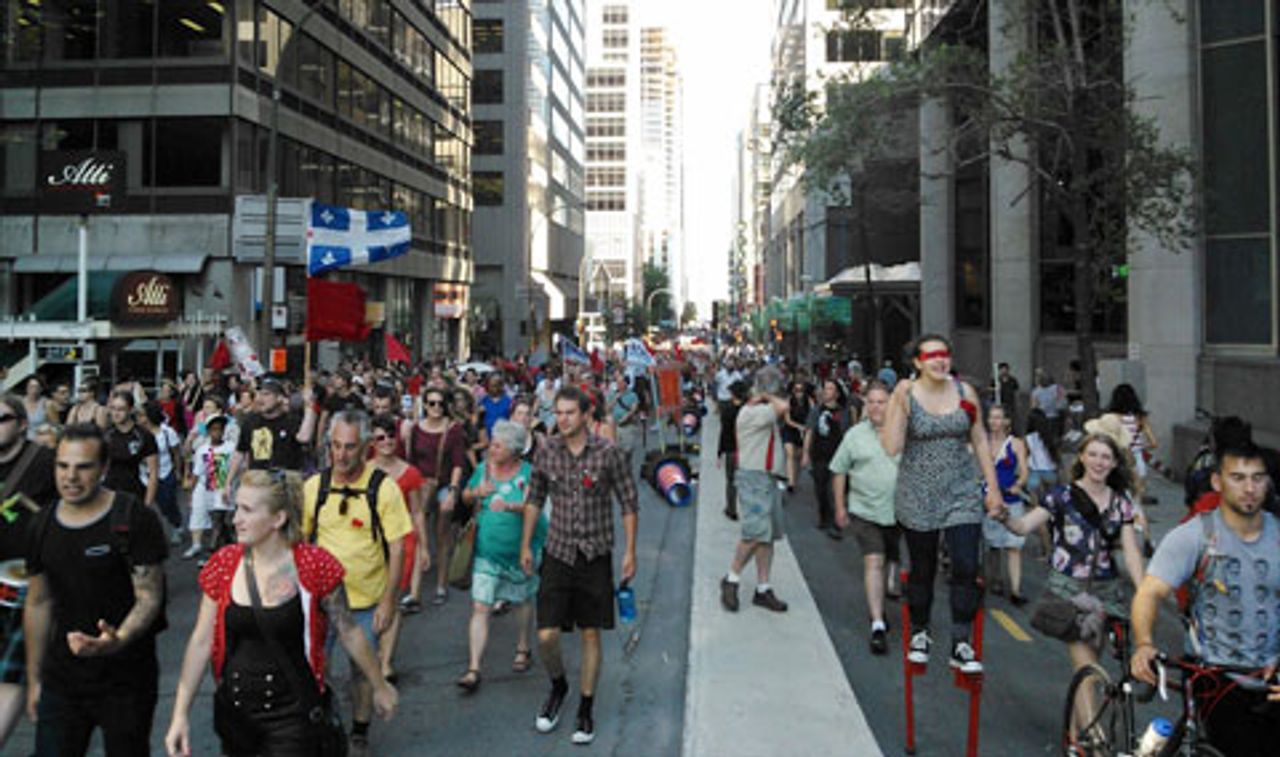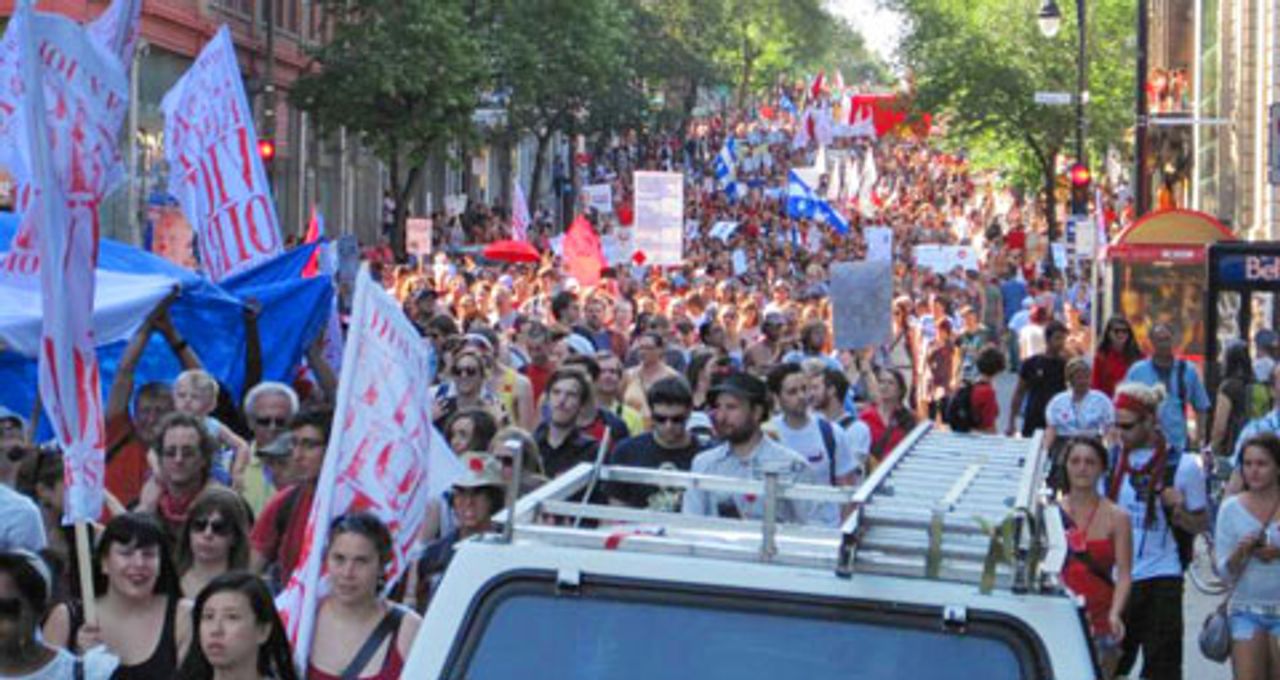 Tens of thousands of students and their supporters demonstrated through downtown Montreal Wednesday.
Tens of thousands of students and their supporters demonstrated through downtown Montreal Wednesday.Tens of thousands of students and working people demonstrated through downtown Montreal Wednesday to protest against the provincial Liberal government’s plans to raise university tuition fees and make the reactionary “user pay principle” for public services the new norm.
The demonstration was called by the student group CLASSE and the Coalition opposée à la tarification et à la privatisation des services publics (Coalition against the tariffication and privatization of public services), a coalition of trade unions, and student and community groups.
Wednesday’s demonstration was the sixth consecutive mass protest organized by CLASSE on the 22nd day of the month. The tradition of demonstrating on the 22nd began last March when striking students mounted one of the largest demonstrations in Quebec history and sunk roots on May 22, when more than 250,000 people took to the streets to denounce Bill 78—a draconian law, adopted just five days earlier, that criminalized the student strike and placed sweeping restrictions on the right to demonstrate over any issue anywhere in Quebec.
In the run-up to Wednesday’s demonstration, the six-month-long Quebec student strike largely petered out, although not even the students’ minimum demand, the rescinding of the tuition hikes, has been met.
The unions systematically isolated the striking students, leaving them to face alone the threat of criminal sanctions under Bill 78 (Law 12) and police violence. At the same time they and the student-associations most directly under their political influence, FECQ and FEUQ, sought to divert the students and the broader opposition movement that erupted in response to Bill 78 behind the big business Parti Quebecois (PQ).
 Wednesday's march was the sixth consecutive mass protest held on the 22nd of the month.
Wednesday's march was the sixth consecutive mass protest held on the 22nd of the month.When the strike was at its height last Spring, CLASSE called for defiance of Bill 78 and briefly flirted with the notion of a “social strike,” a broader protest movement, involving limited job action. But once the unions made clear their vehement opposition to anything that was suggestive of a political strike and their intention to obey and enforce Bill 78, CLASSE’s leadership jettisoned all talk of a “social strike.”
In the ensuing two-and-a-half-months, CLASSE has moved increasingly to the right, elaborating ever more clearly and fully its protest and Quebec nationalist perspective—that is its opposition to a turn to the working class and the fight to fuse the students’ struggle with a cross-Canada movement of the working class against the austerity measures of the Quebec and Ontario Liberal and federal Conservative governments.
CLASSE’s turn to the right is exemplified by its failure to make any criticism whatsoever of the unions for opposing its “social strike” call and the repeated statements of its spokespersons suggesting that the defeat of the Liberals at the hands of the PQ in the September 4 provincial election would be a gain if not an outright victory for the students.
The large turnout in Wednesday’s demonstration attests to the fact that youth and workers are as determined as ever in their opposition to the Liberal government and its rightwing agenda and increasingly animated by anti-big business and anti-capitalist sentiment.
But CLASSE made no effort to draw the political lessons of the past six months of struggle. On the contrary, the manner in which it organized Wednesday’s protest reveals it is becoming ever more explicitly nationalist, moving closer to the unions, and increasingly providing them with political cover; all the while repeating its familiar protest refrain—as typified by the slogan “Crions plus fort pour que personne ne nous ignore” (Shout louder so that no one can ignore us).
None of the three speakers who addressed the demonstration at its outset made any mention of the Parti Quebecois, although polls indicate that it is poised to win the plurality of the seats and there is a massive union-led campaign to divert the opposition to Charest behind the Quebec ruling elite’s alternate party of government. This campaign extends to the ostensibly leftwing Quebec Solidaire, which in the immediate aftermath of the explosion of popular opposition to Bill 78 proposed an electoral pact with the PQ and has said it would welcome the opportunity to work with a PQ minority government.
CLASSE spokesperson Jeanne Reynolds complained that the political parties had said little about students and education during the election campaign. She vowed that the student movement would continue and be needed to pressure the politicians whatever the result of the September 4 election.
She and the two other speakers denounced neo-liberalism, not capitalism, promoting the reactionary illusion that the assault on the social gains of the working class being mounted by big business and its political representatives the world over is the product of greed, not the inherent bankruptcy of capitalism. The corollary to this claim is the assertion that through protest it will be possible to pressure the elite into reverting to the Keynesian and social welfare policies it pursued decades ago at the height of the post-Second World War boom.
Significantly, for the first time, CLASSE invited a trade union bureaucrat to address one its major rallies. Régine Laurent, the president of the Fédération interprofessionnelle de la santé du Québec (FIQ, the Quebec Interprofessional Health Federation) joined in the denunciation of “neo-liberalism” and in a piece of hyperbole that conveniently overlooked the massive upsurge of the working class in the late 1960s and early 1970s praised the students for mounting the “largest social movement in Quebec history.”
Laurent and the FIQ leadership had, it need be noted, only the day before welcomed PQ leader Pauline Marois to their headquarters. The purported purpose of their meeting was for a discussion on health care, but it was in fact a transparent attempt to boost the PQ’s electoral prospects. Following the meeting FIQ issued a press release declaring itself “satisfied” with its “friendly” meeting with Marois.
Supporters of the Socialist Equality Party and the International Students for Social Equality intervened at the demonstration to fight for students and workers to draw the lessons of the strike, above all the need for the mobilization of the working class as an independent political force on the basis of a socialist-internationalist program. More than a thousand copies of the statement “Political lessons of the Quebec student strike” were distributed.
The World Socialist Web Site spoke interviewed some of the participants in Wednesday’s march.
Émilie Rondeau, a nurse, said she hoped the strike would resume after the elections. Pointing to the massive social spending cuts the PQ carried out when it last held office, she said, “I don’t believe in the PQ. Apart from the question of sovereignty (Quebec independence), they are the same as the Liberals. Marois and (Quebec Liberal Premier) Charest are six-of-one and half-a-dozen of the other.
“The unions,” added Émilie, “smothered the strike. They didn’t support the movement. I don’t really believe in the big unions.
“My employer told me, as a nurse, I shouldn’t have the right to wear the red square (the symbol of the strike. Wearing the red square is very touchy at work. There’s intimidation.”
Simon, a geography student at UQAM, expressed disappointment over the fact the strike had fizzled out, although he wasn’t sure why that had happened.
“We haven’t really made gains. I don’t know why we’re in a so-called truce. We’ve been on strike for six months; I don’t see why we would stop now.
Simon added that he is not “all that excited about the idea of independence. It would be easier to take decisions because it would be on a smaller scale, but class conflicts would remain. There’d be the same problems, just in a smaller arena.”
Receive news and information on the fight against layoffs and budget cuts, and for the right to free, high-quality public education for all.
